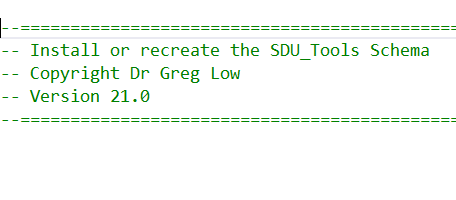SDU Tools version 21 is now released for download

Version 21 of our free SDU Tools for developers and DBAs is now released and winging their way out to our SDU Insiders.
You can find details on the tools here.
If you haven’t been using SDU Tools yet, I’d suggest downloading them and taking a look. At the very least, it can help when you’re trying to work out how to code something in T-SQL.
Along with the normal updates to SQL Server versions and builds, we’ve added the following new functions:
CreateAnalyticView - this new tool helps to support automating the scripting of analytic views based upon existing data warehouse tables. It will be particularly of use to anyone following our methods in the Implementing Power BI in the Enterprise workshops or upcoming book.
WeekdayAcrossYears - this one was requested by Dave Dustin. It’s a new function that returns the day name for a given day and month number for a range of years. (For example, which day of the week will my birthday be for the next ten years?)
SQLServerType - this new function returns the type of server that you are attached to. For example, it can help you to know if you are connected to a SQL Server database or an Azure SQL Database or an Azure SQL Managed Instance.
The following tools have been upgraded:
SplitDelimitedString - this tool now uses a much faster method. It works the same, just much faster.
ListUseOfDeprecatedDataTypes - this procedure has been updated and provides an additional output column that gives you an example of the T-SQL script that you might need to execute to correct the inappropriate data type. (Thanks to Michael Miller for the suggestion)
GREATER and LEAST have been added to the list of reserved words.
The list of exceptions in the ProperCase function has been expanded. (Thanks to John Reitter for the suggestions)
And of course, there are a few corrections included as well.
StartOfFinancialYear - we fixed a scenario where the wrong year could be returned.
ChineseYears - we fixed a typo in the year of the goat (Thanks again to Dave Dustin)
UnixTimeToDateTime2 and DateTime2ToUnixTime - now use bigint values to ensure they’ll avoid the Unix 2038 problem. (Thanks to Bob Roberts for this one)
Scripting functions that output column lengths for nchar and nvarchar were corrected.
Check out all the available functions, procedures, and views here.
2021-04-14
